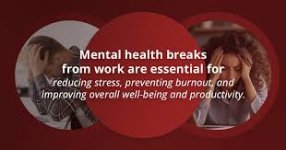In today's high-stakes sports world, we idolize strength, endurance, and resilience. But what happens when the real battle isn’t physical—but mental? While a sprained ankle earns sympathy and time off, anxiety or depression often gets brushed aside as a “personal problem.” It’s time we change the game.
Mental health breaks should be treated with the same respect and protection as injury leave. Period.
Athletes aren’t machines—they’re humans under immense pressure. The world watches their every move, every win, every fall. Mental stress builds with every headline, every performance expectation, and every online comment. So why do we still treat psychological struggles as signs of weakness?
Let’s take a moment to remember tennis star Naomi Osaka, who shocked the world by stepping away from the French Open to protect her mental health. Or Simone Biles, the most decorated gymnast in history, who pulled out of key Olympic events because her mental health was at risk. These weren’t excuses—they were acts of courage.
Physical injuries are visible. There’s an MRI scan or an X-ray to prove something’s wrong. But mental injuries? They’re silent, hidden, and yet just as damaging. Ignoring them doesn’t make them disappear. In fact, pushing through can make things worse—not only mentally but also physically. Burnout leads to injuries, poor performance, and early retirements.
Protecting mental health breaks doesn't mean athletes are avoiding work—it means they're choosing longevity over collapse. Teams and leagues that support mental health time off foster healthier, more loyal, and better-performing athletes. The NBA, NFL, and even the Olympics have started investing in mental wellness programs. But policies still vary, and the stigma lingers.
We’ve normalized taping up ankles and icing bruises. Let’s also normalize therapy sessions and mental rest days. Just like physical rehab, mental recovery deserves structure, time, and—most importantly—respect.
This isn't just a sports issue—it's a human issue. Whether on a court, field, or office floor, mental health matters.
So the question isn’t should mental health breaks be protected like injury leave.
The real question is: Why haven’t they been all along?
Mental health breaks should be treated with the same respect and protection as injury leave. Period.
Athletes aren’t machines—they’re humans under immense pressure. The world watches their every move, every win, every fall. Mental stress builds with every headline, every performance expectation, and every online comment. So why do we still treat psychological struggles as signs of weakness?
Let’s take a moment to remember tennis star Naomi Osaka, who shocked the world by stepping away from the French Open to protect her mental health. Or Simone Biles, the most decorated gymnast in history, who pulled out of key Olympic events because her mental health was at risk. These weren’t excuses—they were acts of courage.
Physical injuries are visible. There’s an MRI scan or an X-ray to prove something’s wrong. But mental injuries? They’re silent, hidden, and yet just as damaging. Ignoring them doesn’t make them disappear. In fact, pushing through can make things worse—not only mentally but also physically. Burnout leads to injuries, poor performance, and early retirements.
Protecting mental health breaks doesn't mean athletes are avoiding work—it means they're choosing longevity over collapse. Teams and leagues that support mental health time off foster healthier, more loyal, and better-performing athletes. The NBA, NFL, and even the Olympics have started investing in mental wellness programs. But policies still vary, and the stigma lingers.
We’ve normalized taping up ankles and icing bruises. Let’s also normalize therapy sessions and mental rest days. Just like physical rehab, mental recovery deserves structure, time, and—most importantly—respect.
This isn't just a sports issue—it's a human issue. Whether on a court, field, or office floor, mental health matters.
So the question isn’t should mental health breaks be protected like injury leave.
The real question is: Why haven’t they been all along?

